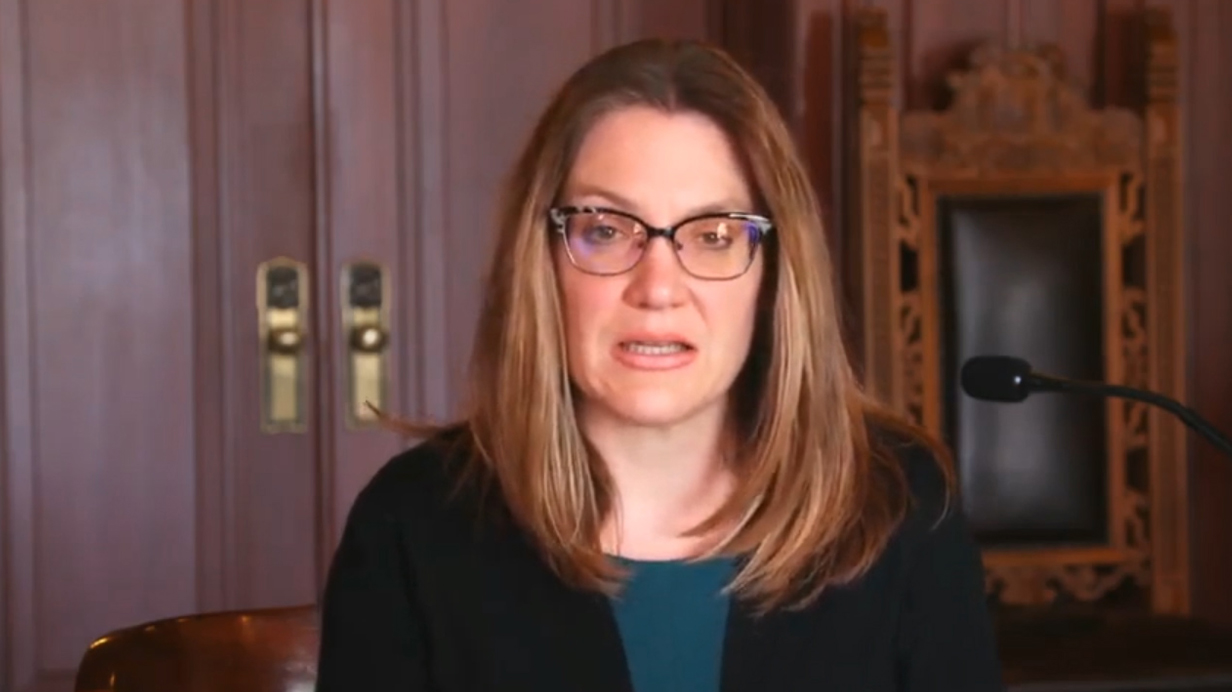
MacIver News Service | Apr. 21, 2020
The Wisconsin Legislature filed a lawsuit directly with the State Supreme Court on Tuesday challenging DHS Secretary-Designee Andrea Palm’s authority to keep Wisconsin’s economy closed and its residents locked down indefinitely – when even Gov. Evers does not have that power.
The lawsuit accuses the Department of Health Services (DHS) Secretary-Designee of violating state law by extending the governor’s emergency rules, exceeded her authority by closing businesses and locking down individuals, acting “arbitrarily and capriciously” in her order, and usurping the legislature’s oversight powers. The lawsuit seeks a temporary injunction.
“The governor has denied the people a voice through this unprecedented administrative overreach. Unfortunately, that leaves the legislature no choice but to ask the Supreme Court to rein in this obvious abuse of power,” Assembly Speaker Robin Vos and Senate Majority Leader Scott Fitzgerald wrote in a joint statement. “Wisconsinites deserve certainty, transparency, and a plan to end the constant stream of executive orders that are eroding both the economy and their liberty even as the state is clearly seeing a decline in COVID infections.”
Gov. Evers’ issued a shelter-in-place order that went into effect on March 25, he calls “Safer at Home.” It shutdown businesses and organizations he deemed “non-essential,” and banned all gatherings of any number outside of a single family unit. That order was originally scheduled to end on April 24, but Evers has the ability to extend it up to May 10. That’s the day his emergency powers expire and he needs legislative approval to continue his original state of emergency.
This is the second time in a month that Gov. Evers has set off a constitutional crisis in Wisconsin.
However, on April 16, Evers announced that his Health Services Secretary Designee, Andrea Palm, has the power to extend the public health emergency as long as she wants. Palm subsequently issued Emergency Order #31, closing the state indefinitely. This is the second time in a month that Gov. Evers has set off a constitutional crisis in Wisconsin.
As the lawsuit explains, “Incredibly, the Secretary took this unprecedented action without following any of our State’s requirements for rulemaking, while also intentionally waiving any reliance on the Governor’s emergency authorities, set to expire before this Order. If a single bureaucrat can evade the controls and accountability measures that the Legislature has enacted to control agency overreach simply by labeling what is obviously an emergency rule a mere “order,” then all of the reforms that the Legislature has put in place, and which this Court has interpreted and enforced over the years, are a meaningless, dead letter—in their most consequential application.”
On Monday, Gov. Tony Evers explained the details of “Badger Bounce Back,” his plan to eventually end his Safer at Home order. His criteria include: a straight 14-day decline in reported symptoms, a straight 14-day decline in positive test rates, hospitals must have testing procedures for at-risk workers, and 85,000 processed tests a week. The state will pass through three phases as these goals are reached and maintained.
“These are not criteria for reopening, they’re roadblocks,” Vos and Fitzgerald observed. “The public outcry over the Safer at Home order continues to increase as positive COVID cases decrease or remain flat. There’s immense frustration regarding the extension, as it goes beyond the executive branch’s statutory powers. Wisconsinites are forced to sit by with no voice in the process.”
“Reminiscent of propaganda issued by third-world governments, they give it an uplifting name the ‘Badger Bounce Back Plan,’ but its details are not about bouncing back. In action, this decree will lead to permanent small business closings and bankruptcies,” Sen. Steve Nass (R-Whitewater) said.
During a press conference, Evers made it clear that the state is nowhere near the start of Phase 1, which includes opening restaurants, retailers, childcare and K-12 in-person education. Given that Evers cancelled the remainder of the school year, Phase 1 cannot be fully implemented until the coming fall.
“At the press conference today, the Governor gave no answers to when his benchmarks would be met, giving no clear direction at all. Where are the metrics and targets he is tracking to get us to the point of reopening? I strongly encourage Governor Evers to go back to the drawing board and come back with a workable plan that provides hope and relief to the people of Wisconsin. Far too many people are struggling, left in the turbulent wake of Governor Evers’s policies,” Joint Committee on Finance Co-Chair John Nygren stated.
“Governor Evers’ new order makes it clear that he does not plan to open Wisconsin any time in the near future. Meeting the requirements outlined just to reach Phase One of his plan may be months away as they are impossible to meet with current testing capabilities, with no guidance on how the state will get the economy back on track,” Waukesha County Executive Paul Farrow stated.
Industry leaders across the state immediately started pushing back. The Tourism Federation of Wisconsin called for a plan to reopen the state before May 26. The Tavern League wants to reopen on May 1 by implementing special safety measures.